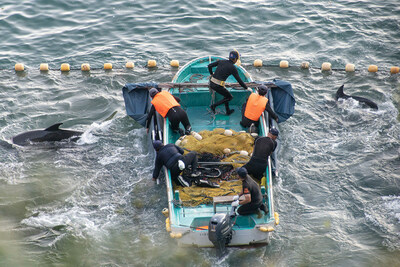Travel companies operating in Canada complicit in Taiji dolphin hunts, new report reveals
TORONTO, April 9, 2024 /CNW/ - A new report by World Animal Protection and Action for Dolphins has exposed the tourism industry's connection to the Taiji dolphin hunts, notorious for the slaughter of hundreds of dolphins each year and the brutal capture of wild dolphin pods off the coast of Japan.
Waves of Profit: How the Tourism Industry Profits from the Taiji Dolphin Hunts shows how six major travel companies are linked to the Taiji hunts by selling tickets to 107 tourist venues in 17 countries that have sourced dolphins from the Taiji, including:
- GetYourGuide (which is expanding its market share in Canada)
- Groupon
- TUI
- Trip.com
- Klook
- Traveloka
World Animal Protection is calling on those companies, particularly GetYourGuide, to remove these cruel venues from their supply chain immediately. Extensive polling has shown Canadians are strongly opposed to the exploitation of dolphins and other wild animals for entertainment.
"Tourists and the travel industry have the power to stop this cruelty," says World Animal Protection's Campaign Director, Melissa Matlow. "By not purchasing tickets to dolphin entertainment venues and not booking trips with travel companies supporting this industry, travellers can play an important role in keeping dolphins in the wild, where they belong."
The annual dolphin hunt, off the coast of Taiji, Japan has received worldwide condemnation for the cruelty it causes. Hunters bang on steel poles in the ocean to disorient pods of migrating dolphins and lead them to a cove where they are trapped and hunted. Some are brutally slaughtered for meat while many more are sold to the under regulated aquarium industry to be used for entertainment purposes. Many of these dolphins will die in transport from stress, injury and trauma.
Every year World Animal Protection Canada receives countless letters from supporters opposed to the hunt.
"It's time for the global community to wake up to what is happening to our dolphins every year here in Taiji, for the profit of the tourism industry. Make no mistake, irresponsible travel companies are fuelling this hunt, and they are relying on uninformed travellers to continue this brutal practice. Japan's dolphins are not for sale. They play a critical role in our oceans, and we must work together to end their exploitation," says Laila Imai, co-founder of grassroots dolphin protection organization, Freedom for Dolphins Japan.
With consumption of dolphin meat declining significantly, and the price of a live dolphin ranging as high as $150,000 USD, it is clear the live dolphin trade supplying tourist attractions is the economic driver fuelling this cruel hunt.
After World Animal Protection Canada's urging, the federal government and several Canadian travel companies have shown leadership in ending the dolphin entertainment industry.
- In 2019, the Government of Canada banned the capture and breeding of dolphins for tourist entertainment
- This law meant the dolphins at Marineland in Niagara Falls are the last generation of dolphins to suffer in captivity for entertainment purposes.
- Canadian airline vacation companies Air Transat, Air Canada, WestJet and Sunwing committed to phase out their sale and promotion of captive dolphin venues globally.
"This report is a reminder to all vacation providers that this type of entertainment shouldn't be sold, and they should publicly report on their progress removing harmful venues from their supply chain to show transparency," added Matlow.
Globally, there has been a shift away from dolphin entertainment. Twenty-two countries, including Canada, have banned the import of wild caught dolphins.
Thanks to World Animal Protection's global campaign Behind the Smile and over 350,000 of our supporters, Expedia became the latest among travel agencies to stop selling tickets that include dolphin shows.
The full report, Waves of Profit: How the Tourism Industry Profits from the Taiji Dolphin Hunts can be found here..
Imagery can be found here.
World Animal Protection is the global voice for animal welfare, with more than 70 years' experience campaigning for a world where animals live free from cruelty and suffering. We have offices in 12 countries and work across 47 countries. We collaborate with local communities, the private sector, civil society and governments to change animals' lives for the better.
Action for Dolphins has been working to impact the economic viability of hunting dolphins in Taiji, Japan, for 12 years. In 2015, Action for Dolphins brought a legal action against the World Association of Zoos and Aquariums which led to 62 Japanese aquariums cutting ties with the dolphin hunts.
SOURCE World Animal Protection
News published on and distributed by:




